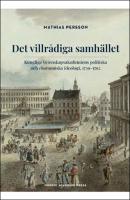Det villrådiga samhället
Kungliga Vetenskapsakademiens politiska och ekonomiska ideologi, 1739–1792
| dc.contributor.author | Persson, Mathias | |
| dc.date.accessioned | 2021-02-12T11:44:01Z | |
| dc.date.available | 2021-02-12T11:44:01Z | |
| dc.date.issued | 2020 | |
| dc.identifier | ONIX_20210212_9789188909442_7 | |
| dc.identifier.uri | https://library.oapen.org/handle/20.500.12657/46720 | |
| dc.language | Swedish | |
| dc.subject.classification | thema EDItEUR::K Economics, Finance, Business and Management::KC Economics::KCZ Economic history | en_US |
| dc.subject.classification | thema EDItEUR::N History and Archaeology::NH History | en_US |
| dc.subject.classification | thema EDItEUR::J Society and Social Sciences::JB Society and culture: general::JBC Cultural and media studies::JBCC Cultural studies::JBCC9 History of ideas | en_US |
| dc.subject.classification | thema EDItEUR::P Mathematics and Science::PD Science: general issues::PDX History of science | en_US |
| dc.subject.other | estate society | |
| dc.subject.other | ideology | |
| dc.subject.other | Gustav III | |
| dc.subject.other | Age of Liberty | |
| dc.subject.other | Royal Swedish Academy of Sciences | |
| dc.subject.other | eighteenth century | |
| dc.title | Det villrådiga samhället | |
| dc.title.alternative | Kungliga Vetenskapsakademiens politiska och ekonomiska ideologi, 1739–1792 | |
| dc.type | book | |
| oapen.abstract.otherlanguage | The Royal Academy of Sciences was an important organization in eighteenth-century Sweden. It brought together scientists and scholars contributing to a wide spectrum of areas, encompassing nature as well as society. But it also maintained close ties to the elite and the political establishment. The academy formed part of the institutional landscape of power and functioned as a consultive body and an arena for the upper echelons of the Swedish realm. The monograph sheds light on the political and economic outlook of the Royal Academy of Sciences during the period 1739–1792 against the background of its intimate connections to the ruling stratum. Not least the Hat Party, which dominated the Swedish political scene during the Age of Liberty, and the autocratic King Gustav III. The study shows that the members of the academy overall gravitated towards traditional viewpoints and that their conceptualizations of society were substantially affected by their interactions with the power holders. While some fellows offered new ideas in line with an increasing contemporary emphasis on spontaneous societal development and the capability of individuals to act responsibly on their own accord, such notions were by no means prevalent. Moreover, the book demonstrates that neither the academy nor its members constituted a passive tool for the elite and the powers that be. Rather, they engaged in self-promotion by attributing themselves a crucial role in the project of general improvement they envisioned and added to. | |
| oapen.identifier.doi | 10.21525/kriterium.27 | |
| oapen.relation.isPublishedBy | 7b034f4a-b816-4718-88ac-63b24c8e4b24 | |
| oapen.pages | 345 | |
| oapen.place.publication | Gothenburg |

